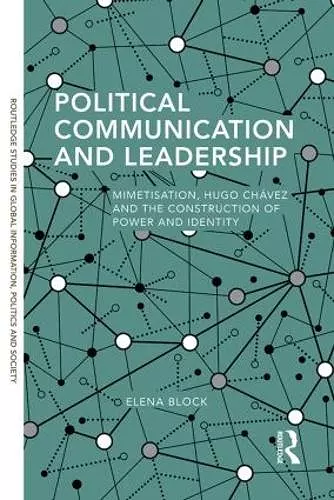Political Communication and Leadership
Mimetisation, Hugo Chavez and the Construction of Power and Identity
Format:Hardback
Publisher:Taylor & Francis Ltd
Published:18th Aug '15
Currently unavailable, and unfortunately no date known when it will be back
This hardback is available in another edition too:
- Paperback£49.99(9780815370215)

The long-lasting hegemonic rule of President Hugo Chávez not only involved significant rearrangements in the control of political power in Venezuela but also shifts in the way its citizens constructed, connected and interacted with politics. In this book, Elena Block explores the political communication style developed by Chávez to transmit his ideologies and engage with his publics — A style that unfolded incrementally between 1998, the year of his first presidential campaign, and March 13th 2013 when his death was announced after a long struggle with cancer. What sort of political communication did Hugo Chávez develop to establish hegemony in Venezuela? What made him so popular?
Block argues that Chávez’s political communication style can be better understood through the concept of mimetisation, a systematic sequence of communicational events and practices whereby the Venezuelan President managed to build a bond with his constituents. Applying a mixed qualitative method of collection and analysis of relevant data, this phenomenon is examined via the President’s emotional use of common cultural symbols; dramatized and informalised language; savvy use of communication and media, and boost of inclusive, compensatory, and participatory practices in which his constituents not only felt mimetically mirrored, but also endowed with an identity.
Shedding new light on contemporary theories of populism from the perspective of political communication and identity construction, the notion of mimetisation can be adjusted and applied to study the links of populist phenomena, the mediatisation of politics and government, cultural appeal and identity politics in other cultures and situations in contemporary times.
"In this important book, Elena Block traces the communication style of Hugo Chávez. Employing what she calls ‘the logic of mimetisation’, Block shows how Hugo Chávez used a complex set of cultural symbols, populist ideologies and practices and a unique style of communicational government to build a close bond with his constituents. A bond that led to the emergence of a collective identity called Chávez. This book will be of interest to anyone wishing to understand the nature and context of Venezuelan politics and political communication under Hugo Chávez." —Ralph Negrine, University of Sheffield, UK
"This book tells us what is behind the popular – and populist – success of a leader like Hugo Chávez. It provides a fascinating in-depth investigation of the subtle, smart, and effective communication strategies that many populist leaders in Latin America, and perhaps in other contexts, employ to seduce millions of citizens. A timely book that helps to grasp a phenomenon like populism that in the age of sophisticated media technologies still thrives for most part on the ‘old’ factors of emotion, imaginary, identity." —Gianpietro Mazzoleni, University of Milan, Italy
"This is a careful and considered book. Block offers a timely intervention in to debates around the relationship between media, politics, and culture. Her book adds richness not only to our understanding of the appeal of Chávez and the particular kind of leadership that he articulated but also to our understanding of wider, culturally different, processes of political communication."—The International Journal of Press/Politics
ISBN: 9781138905030
Dimensions: unknown
Weight: 521g
284 pages